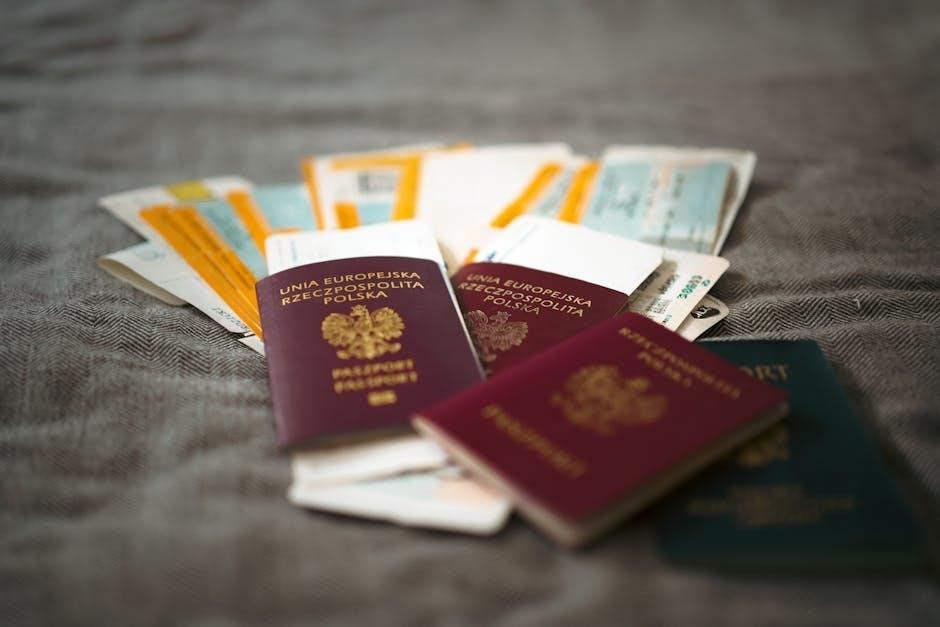Impulse control worksheets are structured tools designed to help individuals manage impulsive behaviors. They include exercises that promote self-awareness‚ self-control‚ and better decision-making.
1.1 What Are Impulse Control Worksheets?
Impulse control worksheets are structured tools designed to help individuals identify‚ manage‚ and regulate impulsive thoughts and behaviors. These worksheets typically include exercises‚ activities‚ and prompts that guide users through self-reflection‚ mindfulness practices‚ and decision-making strategies. They are often used in therapy‚ education‚ or personal development to foster self-awareness and improve emotional regulation. For children‚ they may involve games or drawing exercises‚ while adult versions focus on journaling‚ goal-setting‚ and stress management techniques. By providing a clear framework‚ impulse control worksheets empower individuals to pause‚ reflect‚ and make intentional choices‚ ultimately enhancing their ability to manage impulses effectively in daily life.
1.2 Why Are Impulse Control Worksheets Important?
Impulse control worksheets are essential for fostering self-awareness‚ improving decision-making‚ and enhancing emotional regulation. They provide a structured approach to managing impulsive behaviors‚ helping individuals recognize the consequences of their actions and develop healthier responses to triggers. These tools are particularly beneficial for children‚ teaching them self-control and patience through engaging activities like the Marshmallow Test and Red Light‚ Green Light games. For adults‚ they offer practical exercises for mindfulness‚ stress management‚ and goal-setting‚ promoting better life outcomes. By addressing impulsivity‚ these worksheets empower individuals to build resilience‚ improve relationships‚ and achieve personal growth‚ making them a valuable resource for both therapy and personal development.

Benefits of Using Impulse Control Worksheets
Impulse control worksheets foster self-awareness‚ improve decision-making‚ and enhance stress management. They empower individuals with structured exercises‚ promoting mindfulness and reflection‚ leading to better emotional regulation and personal growth.
2.1 Improved Self-Awareness
Impulse control worksheets enhance self-awareness by helping individuals identify and understand their impulsive thoughts and behaviors. Through structured exercises‚ users can recognize patterns and triggers‚ fostering reflection and insight. By analyzing their actions and emotions‚ individuals gain clarity into how impulses impact their lives. This heightened awareness enables better decision-making and emotional regulation‚ as individuals learn to pause and evaluate before acting. Improved self-awareness is a foundational step in managing impulses effectively‚ leading to more thoughtful and intentional choices. These tools empower individuals to take control of their reactions‚ fostering personal growth and emotional well-being.
2.2 Enhanced Decision-Making Skills
Impulse control worksheets empower individuals to make better decisions by teaching them to evaluate choices carefully. Through guided exercises‚ users learn to weigh the consequences of impulsive actions versus thoughtful decisions. These tools encourage critical thinking and problem-solving‚ helping individuals consider long-term outcomes. By practicing reflection and analysis‚ users develop the ability to pause before acting‚ leading to more deliberate and informed choices. Enhanced decision-making skills foster personal responsibility and reduce the likelihood of regrettable actions. Over time‚ this structured approach helps individuals build a habit of considering the impact of their decisions‚ improving overall life outcomes and relationships.
2.3 Better Stress Management
Impulse control worksheets play a crucial role in helping individuals manage stress effectively. By providing structured exercises‚ these tools enable users to identify stress triggers and develop healthier responses. Worksheets often include techniques like mindfulness‚ deep breathing‚ and reflection‚ which help reduce impulsivity driven by stress. They encourage individuals to pause and assess situations before reacting‚ fostering calm and deliberate actions. Regular use of these worksheets can lead to improved emotional regulation‚ reducing the likelihood of stress-induced impulsive behaviors. Over time‚ users develop resilience and better coping mechanisms‚ enhancing their overall well-being and ability to handle challenging situations constructively.

2.4 Empowerment Through Structured Exercises
Impulse control worksheets empower individuals by offering structured exercises that guide them toward self-awareness and intentional actions. These tools provide clear frameworks for identifying impulsive thoughts and behaviors‚ allowing users to challenge and modify them. Through activities like goal-setting‚ reflection‚ and mindfulness practices‚ individuals gain confidence in their ability to manage impulses. The structured nature of these exercises ensures consistency and progress tracking‚ fostering a sense of accomplishment. By repeatedly practicing these exercises‚ users develop greater self-control and the ability to make thoughtful decisions‚ leading to lasting personal growth and empowerment in managing their impulses effectively over time.

How to Use Impulse Control Worksheets Effectively
Identify impulsive thoughts‚ practice mindfulness‚ and apply effective strategies to manage impulses proactively. Reflect on actions and outcomes to enhance self-awareness and improve decision-making over time.
3.1 Identifying Impulsive Thoughts and Behaviors
Identifying impulsive thoughts and behaviors is the first step in managing them. Worksheets often include exercises that help individuals recognize patterns in their actions and emotions. By acknowledging these impulses‚ users can begin to understand triggers and develop strategies to address them. Activities may involve journaling about specific instances where impulsivity occurred or drawing pictures to visually represent these moments. This process enhances self-awareness‚ allowing individuals to better anticipate and manage impulsive reactions in the future. Over time‚ this practice fosters greater control over thoughts and actions‚ leading to more thoughtful decision-making.
3.2 Practicing Mindfulness and Reflection
Practicing mindfulness and reflection is a cornerstone of impulse control. Worksheets often include exercises that guide individuals to focus on their breath and thoughts‚ helping them stay present. Reflection activities encourage users to analyze past impulsive actions‚ identifying triggers and consequences. By exploring these patterns‚ individuals can develop healthier responses to challenging situations. Mindfulness practices‚ such as meditation or deep breathing‚ are also incorporated to calm the mind and reduce impulsive reactions. Regular reflection fosters self-awareness‚ enabling better decision-making and emotional regulation. Over time‚ these practices help individuals pause before acting‚ leading to more thoughtful and intentional behaviors.
3.4 Applying Stress Management Techniques
Stress management techniques are integral to impulse control. Worksheets often include exercises that teach individuals to recognize stress triggers and employ coping strategies. Techniques like deep breathing‚ progressive muscle relaxation‚ and mindfulness meditation are commonly featured. These practices help calm the nervous system‚ reducing the likelihood of impulsive reactions. Worksheets may also guide users to journal about stressful situations‚ identifying how stress leads to impulsive behaviors and exploring healthier alternatives. By mastering these techniques‚ individuals can better regulate their emotions and respond to stressors more thoughtfully‚ leading to improved impulse control and overall well-being. Consistent practice enhances resilience and emotional stability.

Impulse Control Worksheets for Children
Impulse control worksheets for children include fun activities like the Marshmallow Test and Red Light‚ Green Light games. These tools teach kids to think before acting and understand consequences‚ fostering self-control and patience through engaging exercises.
4.1 Activities for Kids: The Marshmallow Test
The Marshmallow Test is a classic activity designed to teach children self-control and delayed gratification. In this exercise‚ a child is offered a marshmallow or small treat and must choose between eating it immediately or waiting to receive an additional one later. Conducted in a distraction-free environment‚ the test helps kids practice resisting impulses and considering the benefits of waiting. This simple yet effective tool fosters patience and decision-making skills‚ encouraging children to think about the consequences of their actions. By participating‚ kids learn to manage their desires and develop essential self-regulation abilities that benefit their personal growth and daily interactions.
4.2 Teaching Self-Control Through Games (Red Light‚ Green Light)
The Red Light‚ Green Light game is a fun and interactive way to teach children self-control. One person acts as the “stoplight” while others are “cars” trying to reach the finish line. When the stoplight says “Green light‚” the cars move forward‚ but when they say “Red light‚” everyone must freeze. If the stoplight catches someone moving during a red light‚ that person goes back to the start. This game helps children practice controlling their impulses‚ thinking before acting‚ and understanding the consequences of impulsive behavior. It’s an engaging way to develop self-regulation skills in a playful and relatable manner.

4.3 Drawing Exercises to Reinforce Stop and Think Concepts
Drawing exercises are a creative way to help children visualize and internalize impulse control. Worksheets often include prompts like drawing a stop sign or a thinking face to represent “stop” and “think.” Kids can illustrate situations where they felt impulsive and how they could pause before acting. These exercises make abstract concepts tangible and engaging‚ allowing children to express their thoughts and feelings artistically. By reflecting on their drawings‚ they develop a stronger awareness of their impulses and learn to associate specific symbols with self-control. This method is particularly effective for younger children‚ as it combines learning with creativity‚ making the process enjoyable and memorable.

Impulse Control Worksheets for Adults
Impulse control worksheets for adults provide structured exercises to manage stress‚ improve decision-making‚ and enhance self-awareness. They include reflection‚ mindfulness‚ and goal-setting activities to foster better emotional regulation.
5.1 Reflection and Journaling Exercises
Reflection and journaling exercises are powerful tools for adults to identify and manage impulsive behaviors. By documenting thoughts and emotions‚ individuals can recognize patterns in their actions and develop strategies to pause before reacting. These exercises encourage mindfulness‚ helping adults consider consequences and make intentional decisions. Journaling also serves as a safe space to explore triggers and stressors‚ fostering emotional awareness and resilience. Over time‚ consistent practice enhances self-regulation‚ leading to better impulse control and a reduction in impulsive decisions. These structured activities are often included in impulse control worksheets‚ providing a practical and effective way to cultivate self-awareness and emotional balance in daily life.
5.2 Mindfulness Practices for Managing Impulses
Mindfulness practices are essential for managing impulses‚ as they teach individuals to stay present and aware of their thoughts and actions. Techniques like meditation‚ deep breathing‚ and body scans help individuals pause before reacting impulsively. By cultivating mindfulness‚ adults can better recognize triggers and reduce stress‚ which often fuels impulsive behaviors. These practices encourage self-reflection and emotional regulation‚ allowing individuals to respond thoughtfully rather than react impulsively. Incorporating mindfulness into daily routines enhances self-awareness and improves decision-making skills‚ making it a valuable component of impulse control worksheets for adults. Regular practice fosters long-term emotional balance and self-control.
5.3 Setting Goals and Tracking Progress
Setting clear‚ achievable goals is a cornerstone of impulse control worksheets for adults. By defining specific objectives‚ individuals can break down the process of managing impulses into manageable steps. Tracking progress through journaling or structured exercises provides a visual record of advancements‚ reinforcing motivation and accountability. This practice helps individuals identify patterns‚ celebrate successes‚ and adjust strategies as needed. Worksheets often include sections for goal setting‚ allowing users to outline short- and long-term targets. Regularly reviewing and updating these goals fosters a sense of accomplishment and encourages sustained effort‚ ultimately leading to lasting behavior change and improved self-control.

Real-Life Applications of Impulse Control
Impulse control is essential in daily decisions‚ such as managing finances‚ maintaining healthy habits‚ and fostering positive relationships. Worksheets provide practical strategies to apply these skills effectively.
6.1 Managing Impulses in Daily Decisions
Impulse control worksheets help individuals make thoughtful choices in everyday life. By identifying triggers and consequences‚ users can resist urges like overspending or unhealthy habits. These tools encourage reflection‚ enabling better decision-making in personal and professional settings‚ leading to more balanced and goal-oriented outcomes. Regular practice fosters self-awareness and discipline‚ essential for long-term success in managing impulses effectively.

6.2 Using Worksheets in Therapy or Classroom Settings
Impulse control worksheets are highly effective in therapy and educational environments. Therapists use them to help clients identify impulsive patterns and develop healthier responses. In classrooms‚ teachers incorporate these tools to teach self-control and decision-making skills. Activities like the Marshmallow Test and Red Light‚ Green Light games engage students‚ fostering self-awareness and stress management. Worksheets also serve as visual aids‚ making complex concepts accessible. By integrating these resources‚ professionals create structured environments where individuals can practice mindfulness and reflection‚ leading to improved emotional regulation and better life outcomes for both children and adults.
6.3 Teaching Children to Pause and Reflect
Teaching children to pause and reflect is a cornerstone of impulse control. Worksheets designed for kids often include activities like drawing exercises or role-playing games that encourage mindfulness. Tools such as the “Red Light‚ Green Light” game help children visualize self-control‚ associating “red” with stopping and “green” with safe actions. These exercises foster an understanding of consequences‚ allowing children to develop better decision-making skills. By incorporating reflection into daily routines‚ parents and educators empower children to manage impulses effectively‚ reducing impulsive behaviors and promoting thoughtful actions in various situations.
Impulse control worksheets are invaluable tools for managing impulses. They offer structured exercises to enhance self-awareness and decision-making. Download and use these resources to foster lasting behavioral change.
7.1 Recap of the Importance of Impulse Control
Impulse control is crucial for making thoughtful decisions and avoiding harmful actions. It fosters self-awareness‚ enabling individuals to recognize and manage impulsive behaviors. By practicing impulse control‚ people can improve relationships‚ achieve personal goals‚ and maintain emotional stability. Worksheets provide structured exercises to enhance these skills‚ offering practical tools for both children and adults. Effective impulse control reduces stress and promotes a more balanced life‚ helping individuals navigate daily challenges with greater confidence and resilience. Regular practice strengthens self-regulation‚ leading to long-term positive outcomes in personal and professional settings.

7.2 Encouragement to Download and Use Worksheets
Downloading and using impulse control worksheets is a proactive step toward managing impulsive behaviors. These tools are designed to be practical and accessible‚ offering structured exercises for both children and adults. By using these worksheets‚ individuals can develop greater self-awareness‚ improve decision-making‚ and build healthier habits. They are ideal for personal use‚ therapy sessions‚ or classroom settings‚ providing a clear path to better emotional regulation. Start your journey toward improved impulse control today by downloading these effective resources and take the first step toward a more balanced and mindful life.
